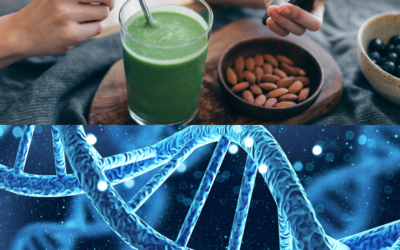Glyphosate, a broad-spectrum herbicide, has become a central figure in agricultural practices across North America since its introduction in the 1970s. Known commercially as Roundup, it revolutionized weed control, making it easier and more efficient for farmers to manage their crops. However, as its use has proliferated, so too have concerns regarding its health impacts. Let’s look at the health risks associated with glyphosate, its effects on the health of North Americans, the differences in its regulation globally, and the benefits of sourcing organic produce.
The Rise of Glyphosate
Glyphosate works by inhibiting an enzyme pathway, the shikimic acid pathway, which is crucial for plant growth. This pathway is absent in animals, initially leading to assumptions about its safety for humans and animals. Glyphosate’s widespread use can be attributed to the advent of genetically modified (GM) crops designed to resist it, allowing farmers to apply the herbicide broadly without damaging their crops.
According to the U.S. Geological Survey, glyphosate usage in the United States has increased nearly 16-fold since the introduction of GM crops in the mid-1990s. In 2016 alone, approximately 287 million pounds of glyphosate were applied to agricultural land in the U.S. This dramatic increase in glyphosate usage has raised significant concerns about its long-term health impacts on humans.
Health Risks of Glyphosate
Carcinogenic Potential
One of the most contentious issues surrounding glyphosate is its potential link to cancer. In 2015, the International Agency for Research on Cancer (IARC), a part of the World Health Organization (WHO), classified glyphosate as “probably carcinogenic to humans” (Group 2A). This classification was based on “limited” evidence of cancer in humans (from real-world exposures) and “sufficient” evidence of cancer in laboratory animals. Numerous lawsuits have followed this classification, with plaintiffs claiming that long-term exposure to glyphosate contributed to their development of non-Hodgkin lymphoma and other cancers.
Endocrine Disruption
Glyphosate has also been implicated in endocrine disruption. Studies suggest that glyphosate and its commercial formulations may interfere with hormonal systems, potentially leading to reproductive issues, developmental problems, and other health impacts. Studies have indicated that glyphosate-based herbicides induce endocrine disruption at levels lower than those used in agricultural settings. This is particularly concerning as endocrine disruptors can have profound and lasting effects on human health, especially in vulnerable populations such as pregnant women and developing fetuses.
Impact on Gut Health
Emerging research indicates that glyphosate may affect gut health by disrupting the gut microbiome. Though absent in humans, the shikimic acid pathway is present in many gut bacteria. Disruption of this pathway can lead to imbalances in the gut microbiota, potentially contributing to conditions such as inflammatory bowel disease (IBD), celiac disease, and other gastrointestinal disorders. A healthy gut microbiome is essential for overall health, influencing everything from immune function to mental health. The potential for glyphosate to disrupt this delicate balance is a significant cause for concern.
Residual Presence in Food
Glyphosate residues in food are another concern. The Environmental Working Group (EWG) found glyphosate in various popular oat-based foods, including cereals and snack bars. These findings are troubling, especially considering that many of these products are marketed toward children, who are more vulnerable to chemical exposures. In a study published in Environmental Health, researchers reported that individuals with higher levels of glyphosate in their urine were more likely to report chronic health conditions, including respiratory and metabolic disorders.
Glyphosate in North America vs. Other Countries
While glyphosate remains widely used in North America, many other countries have taken a more precautionary approach. Several countries, including Germany, Austria, and Vietnam, have announced plans to phase out glyphosate due to health concerns. In contrast, the United States continues to allow its extensive use, with regulatory agencies such as the Environmental Protection Agency (EPA) maintaining that glyphosate is safe when used as directed.
This discrepancy highlights a significant divide in the global approach to glyphosate regulation. The European Union, for instance, has stricter regulations and has taken a more cautious stance, reflecting growing public concern and precautionary principles. This difference in regulatory approach raises questions about the balance between agricultural productivity and public health.
The Benefits of Sourcing Organic Produce
Given the potential health risks associated with glyphosate, sourcing organic produce offers a safer alternative. Organic farming practices prohibit synthetic herbicides like glyphosate, ensuring that organic products are free from these chemical residues.
Nutrient Density
Organic produce is free from harmful chemicals and often more nutrient-dense than conventionally grown produce. A comprehensive meta-analysis found that organic crops have higher concentrations of antioxidants, which are beneficial for health. Specifically, organic crops had significantly higher levels of polyphenols, flavonoids, and other antioxidants than their conventionally grown counterparts.
Reduced Exposure to Pesticides
By choosing organic, consumers can reduce their pesticide exposure, including glyphosate. This is particularly important for vulnerable populations such as children, pregnant women, and those with compromised immune systems. The “American Journal of Clinical Nutrition” published a study indicating that organic diets significantly lower pesticide exposure, which can lead to improved health outcomes.
Environmental Benefits
Organic farming also benefits the environment by promoting biodiversity, improving soil health, and reducing pollution. Healthier soils contribute to healthier plants, which in turn provide better nutrition. Organic farming practices enhance the nutrient content of the soil, leading to more nutrient-dense produce.
Support Detoxification To Minimize Exposure to Glyphosate
Even with careful avoidance, some exposure to glyphosate and other toxins is inevitable. Supporting your body’s natural detoxification pathways can help eliminate these chemicals.
Focus on a fiber-rich diet, cruciferous vegetables (like broccoli and kale), and antioxidant-rich foods that promote liver function and detoxification. Drinking plenty of water, exercising regularly, and getting enough sleep also help the body process and eliminate toxins more efficiently. Consider supplements like activated charcoal, chlorella, or milk thistle to detoxify harmful chemicals, including glyphosate.
The evidence suggests a need for caution regarding the use of glyphosate, from potential carcinogenic effects to endocrine disruption and impacts on gut health. The regulatory differences between North America and other parts of the world further highlight the complexity of balancing agricultural needs with public health.
Sourcing organic produce offers a viable solution. Organic farming reduces exposure to harmful pesticides and provides nutrient-dense, healthier food options. For personalized advice on combatting the health risks associated with herbicides and conventional agriculture, schedule a consultation with us- we would be happy to steer you in the right direction!
References
- IARC Monographs Volume 112: Evaluation of Five Organophosphate Insecticides and Herbicides. International Agency for Research on Cancer (IARC), World Health Organization (WHO). 2015.
- Mesnage, R., & Antoniou, M. N. (2017). Facts and Fallacies in the Debate on Glyphosate Toxicity. “Frontiers in Public Health,” 5, 316.
- van Bruggen, A. H. C., He, M. M., Shin, K., Mai, V., Jeong, K. C., Finckh, M. R., & Morris, J. G. (2018). Environmental and Health Effects of the Herbicide Glyphosate. “Science of the Total Environment,” 616-617, 255-268.
- Barański, M., Rempelos, L., Iversen, P. O., & Leifert, C. (2014). Higher Antioxidant and Lower Cadmium Concentrations and Lower Incidence of Pesticide Residues in Organically Grown Crops: A Systematic Literature Review and Meta-analyses. “British Journal of Nutrition,” 112(5), 794-811.
- Bradman, A., Quirós-Alcalá, L., Castorina, R., Schall, R. A., Camacho, J., Holland, N. T., … & Eskenazi, B. (2015). Effect of Organic Diet Intervention on Pesticide Exposures in Young Children Living in Low-Income Urban and Agricultural Communities. “Environmental Health Perspectives,” 123(10), 1086-1093.
- U.S. Geological Survey. Pesticide National Synthesis Project. Estimated Annual Agricultural Pesticide Use. 2016.





